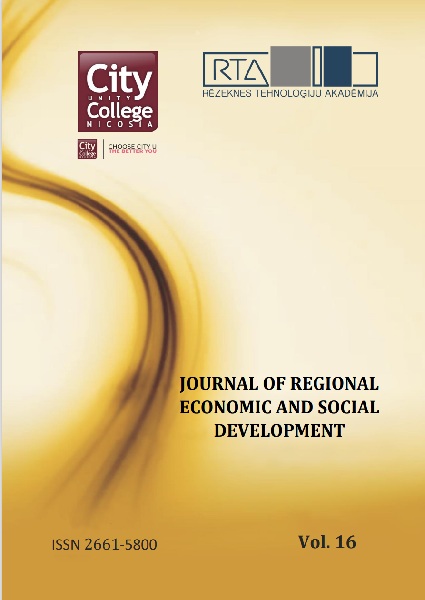CHESS AS AN EDUCATIONAL TOOL FOR SOCIAL INCLUSION AND EMPLOYMENT
DOI:
https://doi.org/10.17770/jresd2024vol16.8268Keywords:
categorisation, chess game, classification, disadvantaged groups, employment, prison inmates, social inclusionAbstract
Purpose and aim of the study: The paper’s aim is to describe and analyse best practices in use of chess as an educational tool for enhancing disadvantaged groups’ social inclusion and employment in selected European countries.
Design / Methodology / Approach: The methodology of descriptive research and study was employed in the present research. A focus group interview was leveraged as the method of data collection in May 2024. A total of 15 respondents from Latvia, Italy, and Spain participated in the interview. Categorisation as a classification method in a descriptive study was used for data analysis.
Main Findings: The data analysis demonstrated that Italy and Spain utilised chess as an educational tool in a non-classical way, while Latvia continued to keep chess as an educational tool in a conventional manner.
Originality: The originality of the paper is shown by three categories of use of chess as an educational tool for disadvantaged groups. The categories were identified as target group, level of initiative, and classical/non-classical use of chess as an educational tool.
Implications: The researcher community could invest more efforts into analyses of use of chess for social inclusion and employment of disadvantaged groups due to the chess game’s unique capabilities.
References
Ahrens, A., Gruenwald, N., Zaščerinska, J., & Melnikova, J. (2019). A Novel Design of the Pre-Processing Stage of Data Mining for Educational Purposes. Proceedings of the 9th BRCEBE & 12th ICEBE, Sibiu, România, 16 - 19 October 2019, 368-376.
Ahrens, A., Purvinis, O., Zaščerinska, J., Micevičienė, D., & Tautkus, A. (2018). Burstiness Management for Smart, Sustainable and Inclusive Growth: Emerging Research and Opportunities. IGI Global. DOI: 10.4018/978-1-5225-5442-4
Ahrens, A., Zascerinska, J., Bikova, A., Aleksejeva, L., Zascerinskis, M., Gukovica, O., & Abjalkiene, I. (2024). Chess Play as a Means of Improving Inclusiveness of Disadvantaged Groups. Education. Innovation. Diversity, 1(8), 134 - 142.
Ahrens, A., Zascerinska, J., Zascerinskis, M., & Bikova, A. (2023). Gender Discrimination in Youth Employment: A Case Study in Germany. Journal of Regional Economic and Social Development, 15, 7-16.
Cano‐Hila, Ana Belén. (2022). Understanding Social Inclusion in Contemporary Society: Challenges, Reflections, Limitations, and Proposals. Social Inclusion, 10(2), 1–5.
Drisko, James W., & Tina Maschi. (2024). Interpretive Content Analysis, Content Analysis, Pocket Guides to Social Work Research Methods (New York, 2015; online edn, Oxford Academic, 19 Nov. 2015).
Dvoryatkina, S., & Simonovskaya., G.A. (2021). Using Chess for Identifying and Correcting “Problem Areas” in the School Math Course. TEM Journal, 10(1), 451-461. ISSN 2217‐8309, DOI: 10.18421/TEM101-57, February 2021.
Farquharson, C., McNally, S. & Tahir, I. (2022). Education inequalities. IFS Deaton Review of Inequalities.
Ferreira, D., & Palhares, P. (2008). Chess and problem solving involving patterns. The Mathematics Enthusiast, 5(2), Article 8. https://doi.org/10.54870/1551-3440.1105
Jankovic, A., & Novak, I. (2019). Chess as a Powerful Educational Tool for Successful People, In: Tipurić, Darko Hruška, Domagoj (Ed.): 7th International OFEL Conference on Governance, Management and Entrepreneurship: Embracing Diversity in Organisations. April 5th -6th, 2019, Dubrovnik, Croatia, Governance Research and Development Centre (CIRU), Zagreb, 425-441.
Kitzinger, J. (1995). Education and debate Qualitative Research: Introducing focus groups. BMJ 1995; 311:299-302 (29 July).
Krippendorff, K. (2004). Content analysis: an introduction to its methodology. Sage Publications Inc., Thousand Oaks, California.
Leinen, P. (2020). The importance of categories. https://www.linkedin.com/pulse/importance-categories-patrick-leinen
Okoli, C., & Pawlovski, S. (2004). The Delphi Method as a Research Tool: an example, design considerations and applications. Information and Management, 42(1), 15-29.
Patton, M.Q. (2002). Qualitative, research & evaluation methods. Sage publications Inc., Thousand Oaks, California.
Robo, M. (2014). Social inclusion and inclusive education. Academicus International Scientific Journal, 10(2):181-191
Romanova, I., Vasylieva, M., & Podberezskyi, M. (2018). Chess therapy as a new trend in training of future social pedagogues. Journal of Physical Education & Sport, 18, 1820. DOI: 10.7752/jpes.2018.s4266
Seger, CA, & Peterson, EJ. (2013). Categorization = decision making + generalization. Neurosci Biobehav Rev. 2013 Aug;37(7):1187-200. DOI: 10.1016/j.neubiorev.2013.03.015
Senthil, B. Arul, & Ravindran, D. (2023). Relationship Between Chess and Management – An Overview. Journal Formation of Competencies of Gifted Individuals in the System of Extracurricular and Higher Education, 1 (2023). https://doi.org/10.18372/2786-823.1.17464
Siu, K.W.M. (2010). Enhancing social inclusion: Universal chess design for blind people. https://www.researchgate.net/publication/289782918_Enhancing_social_inclusion_Universal_chess_design_for_blind_people
Talend. (2024). What is data reliability? Definition and assessment guide. A Qlik Company.
United Nations. (2016). Leaving No One behind: The Imperative of Inclusive Development. Report on the World Social Situation 2016. https://www.un.org/esa/socdev/rwss/2016/full-report.pdf.
White, J. (2012). Education and Well-being. In Susan David, Ilona Boniwell, and Amanda Conley Ayers (Eds.), The Oxford Handbook of Happiness, Section 6: Positive Education Chapter 41: Education and well-being. Publisher: Oxford University Press.
Zaščerinska, J., Aļeksejeva, A., Aļeksejeva, L., Gloņina, O., Zaščerinskis, M., & Andreeva, N. (2015). Formal Adult Education in Latvia: Focus Group Interview. In O. Clipa & G. Cramariuc (eds.), Educatia in societatea contemporana. Aplicatii (287-294). Iasi, Romania: Editura LUMEN.
Downloads
Published
Issue
Section
License
Copyright (c) 2024 Andreas Ahrens, Antonia Castellani, Maria Chiara Di Francesco, Jelena Zascerinska, Mihails Zascerinskis, Anastasija Bikova, Irina Abjalkiene, Olga Gukovica, Ludmila Aleksejeva

This work is licensed under a Creative Commons Attribution 4.0 International License.


